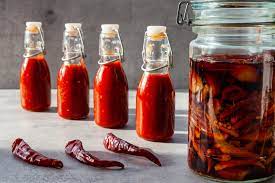When it comes to dietary restrictions, gluten-free diets have become increasingly popular in recent years. Many people are looking for gluten-free alternatives for various food items, including condiments like hot sauce. In this article, we will explore the question, “Is hot sauce gluten-free?” We will delve into the ingredients commonly found in hot sauce, discuss gluten-related concerns, and provide insights to help you make informed decisions. So, let’s dive in!
What is Gluten?
Gluten is a protein composite found in wheat, barley, rye, and related grains. It gives dough its elasticity, helping it rise and maintain its shape. However, gluten can trigger adverse reactions in individuals with certain medical conditions.
Gluten and Celiac Disease
Celiac disease is an autoimmune disorder where the ingestion of gluten leads to damage in the small intestine. People with celiac disease must follow a strict gluten-free diet to avoid symptoms and complications.
Gluten-Free Diet Explained
A gluten-free diet excludes all sources of gluten. It involves consuming foods that are naturally gluten-free or processed to remove gluten. Following a gluten-free diet is crucial for those with celiac disease, gluten sensitivity, or wheat allergy.
Understanding Hot Sauce
Hot sauce is a popular condiment known for its spicy flavor. It typically contains a combination of chili peppers, vinegar, salt, and various seasonings. However, the ingredients may vary depending on the brand and recipe.
Common Ingredients in Hot Sauce
Hot sauce ingredients can include chili peppers, distilled vinegar, salt, garlic, onions, spices, and preservatives. It’s essential to check the label for any potential gluten-containing additives or flavorings.
The Gluten-Free Status of Hot Sauce
Most hot sauces are gluten-free since they primarily consist of gluten-free ingredients like chili peppers and vinegar. However, it’s important to be cautious about possible gluten cross-contamination during the manufacturing process.
Gluten Contamination Risks
Gluten contamination can occur when a gluten-free product comes into contact with gluten-containing ingredients or surfaces. This can happen during manufacturing, packaging, or even in restaurant kitchens.
Cross-Contamination in Manufacturing
Some hot sauce brands produce their products in facilities that also process gluten-containing ingredients. Although they may take precautions, there is a risk of cross-contamination. To ensure gluten-free hot sauce, choose brands with dedicated gluten-free facilities or certified gluten-free labels.
Gluten-Free Hot Sauce Brands
Fortunately, numerous hot sauce brands offer gluten-free options. These brands prioritize gluten-free production and undergo rigorous testing to meet the required standards. Look for gluten-free certifications or clear labeling on the product.
Making Homemade Gluten-Free Hot Sauce
Making your own gluten-free hot sauce can be a fun and rewarding experience. By using fresh ingredients and ensuring a gluten-free kitchen environment, you have full control over the process. Explore recipes online and get creative with flavors that suit your taste buds.
Gluten-Free Hot Sauce Alternatives
If you’re unable to find a gluten-free hot sauce that meets your preferences, there are alternatives available. Salsa, chimichurri, or homemade condiments using gluten-free ingredients can provide similar flavor profiles and spice levels.
Enjoying Hot Sauce on a Gluten-Free Diet
Being on a gluten-free diet doesn’t mean you have to give up the joy of adding hot sauce to your meals. By choosing verified gluten-free hot sauce brands or making your own, you can continue to enjoy the zesty kick without worrying about gluten-related issues.
Benefits of Gluten-Free Hot Sauce
In addition to its fiery taste, gluten-free hot sauce offers several benefits. It can add flavor and depth to dishes, stimulate the metabolism, and even provide a boost of vitamin C. Incorporating gluten-free hot sauce into your diet can enhance your culinary experience.
Expert Tips for Choosing Gluten-Free Hot Sauce
- Read labels carefully to identify any potential gluten-containing ingredients or additives.
- Look for hot sauces with dedicated gluten-free facilities or certified gluten-free labels.
- Reach out to the manufacturer if you have specific concerns about cross-contamination.
- Experiment with homemade hot sauce recipes to ensure complete control over the ingredients.
- Check online resources and forums for recommendations on gluten-free hot sauce brands.
Conclusion
In conclusion, hot sauce is generally gluten-free, but it’s crucial to be aware of potential cross-contamination risks during the manufacturing process. By selecting certified gluten-free brands or making homemade hot sauce, you can savor the spicy goodness without compromising your gluten-free diet.
FAQs
Is all hot sauce gluten-free?
While most hot sauces are gluten-free, it’s essential to check the label and ensure there is no cross-contamination during manufacturing.
Can hot sauce contain hidden sources of gluten?
Hot sauce can potentially contain hidden sources of gluten if additives or flavorings with gluten are used. Always read the label or reach out to the manufacturer for clarification.
Are there specific hot sauce brands that are certified gluten-free?
Yes, several hot sauce brands are certified gluten-free. Look for clear labeling or certifications to ensure the product’s gluten-free status.
Can I make my own gluten-free hot sauce?
Absolutely! Making your own gluten-free hot sauce allows you to control the ingredients and eliminate any chances of cross-contamination.
Are there alternatives to gluten-free hot sauce?
Yes, if you cannot find a suitable gluten-free hot sauce, you can explore alternatives like salsa, chimichurri, or homemade condiments using gluten-free ingredients.

